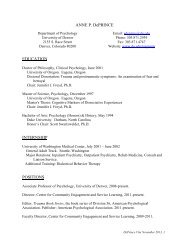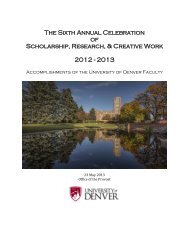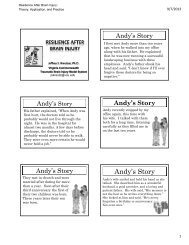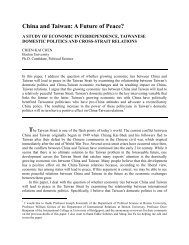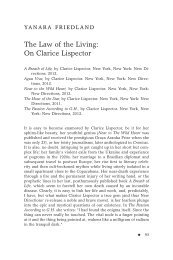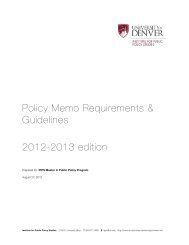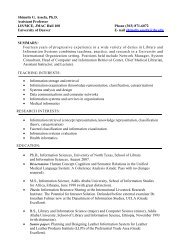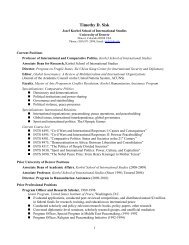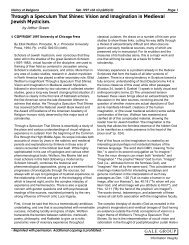You, Your College Student and Alcohol - University of Denver
You, Your College Student and Alcohol - University of Denver
You, Your College Student and Alcohol - University of Denver
Create successful ePaper yourself
Turn your PDF publications into a flip-book with our unique Google optimized e-Paper software.
YOU,<br />
AND ALCOHOL.<br />
Campus Resources<br />
Health <strong>and</strong> Counseling Center<br />
303.871.2205 • info@hcc.du.edu • www.du.edu/duhealth<br />
Parents Program<br />
303.871.3708 • parents@du.edu • www.du.edu/studentlife/parents<br />
Housing <strong>and</strong> Residential Education<br />
303.871.2246 • housing@du.edu • www.du.edu/housing<br />
The Office <strong>of</strong> <strong>Student</strong> Conduct<br />
303.871.3111 • www.du.edu/studentconduct<br />
Parent Resource Guide<br />
<strong>Student</strong> Outreach <strong>and</strong> Support<br />
303.871.4724 • care@du.edu • www.du.edu/studentsupport<br />
Late Night @ DU<br />
303.871.3111 • late-night@du.edu
General <strong>Alcohol</strong> Facts<br />
The reality is that some students will drink alcohol when they go to<br />
college. Sometimes students, especially those who have not had much<br />
experience drinking, overdrink when they first arrive to campus. As<br />
a <strong>University</strong>, we educate students about techniques to monitor their<br />
drinking. <strong>You</strong>, as their parent, can reinforce this by encouraging them to<br />
use the same techniques. Here are a couple <strong>of</strong> things you may or may<br />
not know about alcohol:<br />
• The liver can only process one st<strong>and</strong>ard drink per hour. It is when<br />
people drink more than one drink per hour that they start to feel<br />
the affects <strong>of</strong> alcohol. There is no way to speed this process up.<br />
So if someone were to drink five st<strong>and</strong>ard drinks it would take<br />
approximately five hours for all the alcohol to pass through their<br />
system <strong>and</strong> to be sober again.<br />
• Not all drinks are created equally. For example a Long Isl<strong>and</strong> Iced<br />
Tea can have as much alcohol as 3 to 6 beers, depending on how<br />
it’s made. A st<strong>and</strong>ard drink size for a beer is 12 ounces (a can); 5<br />
ounces for a glass <strong>of</strong> wine (there are typically 5 servings in a bottle);<br />
1.5 ounces <strong>of</strong> hard alcohol (a pint has 11 servings).<br />
• Eating before <strong>and</strong> while drinking slows down the absorption <strong>of</strong><br />
alcohol into the blood stream. Eating foods high in protein, such as<br />
milk or cheese, coats the stomach <strong>and</strong> intestines.<br />
• Alternating between alcoholic <strong>and</strong> non-alcoholic drinks helps to<br />
pace drinking.<br />
• <strong>Alcohol</strong> is a diuretic <strong>and</strong> dehydrates the body. Drinking water will<br />
help ward <strong>of</strong>f the side effects <strong>of</strong> dehydration such as headache <strong>and</strong><br />
overall achiness.<br />
• No matter how you cut it, drinking games are not a good idea. Just<br />
by the nature <strong>of</strong> the games they encourage people to drink more<br />
<strong>and</strong> more quickly than they normally would.<br />
Conclusion<br />
Thank you for continuing to invest in your son or daughter’s future.<br />
<strong>Alcohol</strong> can be a big part <strong>of</strong> the collegiate culture. By talking to your<br />
son or daughter you tell them that you can still be involved in their life<br />
without being physically close to them. <strong>You</strong>, as parents, are still one<br />
<strong>of</strong> the biggest influencers on their behavior. <strong>You</strong> are an important part<br />
<strong>of</strong> their life <strong>and</strong> what you say does matter. Continue the conversation<br />
throughout their college career <strong>and</strong> beyond.
Collegiate <strong>and</strong><br />
Campus Norms<br />
Often times our views on what is normal student behavior are shaped<br />
by our experience or what we see or hear on television or in the<br />
<strong>College</strong> students<br />
generally make<br />
healthy decisions<br />
regarding<br />
alcohol use<br />
movies. The media <strong>of</strong>ten portrays students<br />
as heavy <strong>and</strong> regular drinkers. The truth is<br />
actually quite the opposite. <strong>College</strong> students<br />
generally make healthy decisions regarding<br />
alcohol use. The one thing that you will<br />
notice is that students perceive their peers to<br />
be drinking much more than they actually do.<br />
This gap in reality <strong>and</strong> perception can<br />
influence behavior. The following, taken from the American <strong>College</strong><br />
Health Association – National <strong>College</strong> Health Assessment, are good<br />
talking points while communicating your expectations to your son or<br />
daughter.<br />
Welcome<br />
Congratulations! <strong>You</strong>r son or daughter just made a very<br />
important decision. They have decided to attend The <strong>University</strong><br />
<strong>of</strong> <strong>Denver</strong>! While this is a time <strong>of</strong> transition for your son or<br />
daughter, it is also a time <strong>of</strong> transition for you. <strong>You</strong> are deciding<br />
how much to stay involved in their lives, how much freedom to<br />
give them, what to talk to them about, among many other things.<br />
As your student starts the academic year, they will face many<br />
challenges. As parents, you will want to help them work through<br />
some <strong>of</strong> these challenges. Throughout this document we will<br />
talk about alcohol, one <strong>of</strong> the challenges your student may come<br />
across. We will discuss how to talk to your student, <strong>University</strong> <strong>of</strong><br />
<strong>Denver</strong> policies, facts regarding alcohol <strong>and</strong> campus resources.<br />
After each statistic there will are parentheses which include a simple<br />
talking point you can use.<br />
• In the last 30 days 34.8% <strong>of</strong> students didn’t drink alcohol<br />
(not all college students drink alcohol)<br />
• <strong>Student</strong>s thought that only 5.5% <strong>of</strong> their peers didn’t drink alcohol<br />
in the last 30 days; they do believe that 30.7% <strong>of</strong> their peers drank<br />
on 10 to 14 <strong>of</strong> the last 30 days (it seems like more college students<br />
drink than actually do)<br />
• 26.9% <strong>of</strong> students had zero alcoholic drinks last time they partied;<br />
19.9% had one or two drinks; 20.2% had 3 or 4 drinks<br />
(most students party responsibly when they choose to drink)<br />
• <strong>Student</strong>s thought that 33.6% <strong>of</strong> students had five or six alcoholic<br />
drinks last time they partied; 15.1% had seven or eight drinks;<br />
10.0% had nine or ten drinks (it seems like students drink more<br />
drinks when they choose to drink than they actually do)<br />
• When asked in the last two weeks, “how many times did you drink<br />
five or more alcoholic drinks in one sitting,” 64.9% said none (most<br />
student do not binge drink)
Have the Conversation<br />
Parents <strong>of</strong>ten do not know if they should talk to their students about<br />
alcohol. Parents may feel that drinking alcohol is a right <strong>of</strong> passage;<br />
they did it during college, so it is okay for their son or daughter to do<br />
it during college. The reality is, no matter<br />
...no matter your<br />
own history, it is<br />
okay to talk to<br />
your student<br />
about alcohol use.<br />
your own history, it is okay to talk to your<br />
student about alcohol use.<br />
Some <strong>of</strong> you may have talked to your<br />
student throughout high school about<br />
alcohol <strong>and</strong> this will be a continuation <strong>of</strong><br />
that conversation. For some <strong>of</strong> you this<br />
may be the first time you are broaching<br />
the topic <strong>and</strong> that is perfectly fine too. The<br />
important part is that you are having the conversation now. <strong>You</strong> can<br />
have this conversation when it naturally comes up in conversation, for<br />
example regarding a movie or television show you or he/she has seen.<br />
<strong>You</strong>r son or daughter may even bring up something that happened on<br />
campus over the weekend. Those are all great opportunities to start<br />
a conversation. <strong>You</strong> can also make it a point to talk to them next time<br />
they call home.<br />
Now that you have decided to talk to your son or daughter about<br />
alcohol, you may wonder what to talk to them about. Throughout this<br />
document we will outline different talking points as well as important<br />
reasons for this discussion.<br />
Communicate Expectations<br />
Believe it or not,<br />
you, as their parent,<br />
still have the<br />
strongest influence<br />
on their behavior.<br />
Communicating expectations goes<br />
much beyond just alcohol. It is<br />
important that your student knows<br />
what is expected <strong>of</strong> them academically,<br />
socially, <strong>and</strong> regarding any risky<br />
behaviors. Before your son or<br />
daughter leaves for school, sit down<br />
with them <strong>and</strong> discuss what you<br />
expect from them.<br />
Colorado Laws<br />
When dealing with things such as alcohol use <strong>and</strong> false identification,<br />
it is important to remember that it goes beyond the <strong>University</strong> <strong>of</strong><br />
<strong>Denver</strong> policies, it becomes a legal issue. There are several laws<br />
regarding underage drinking <strong>and</strong> false identification <strong>and</strong> their<br />
charges range from misdemeanors to felonies. It is important for your<br />
son or daughter to underst<strong>and</strong> that the consequences for owning<br />
a false identification may go beyond a fine, community service or<br />
getting in trouble on campus. There are some careers/licensures that<br />
will not allow felonies <strong>and</strong> this will have a long-term affect on your son<br />
or daughter.<br />
If a student gets caught with a fake ID on campus, The <strong>University</strong> <strong>of</strong><br />
<strong>Denver</strong>’s Department <strong>of</strong> Campus Safety will refer them to the Office<br />
<strong>of</strong> <strong>Student</strong> Conduct. If the student gets caught more than once,<br />
Campus Safety will report the violation to the proper law enforcement<br />
agency. At this point it would be likely that criminal prosecution will<br />
be pursued. This will only pertain to students who get caught with<br />
false identification on campus. If an incident happens <strong>of</strong>f-campus,<br />
at a house party or local establishment, law enforcement may be<br />
involved on the first <strong>of</strong>fense. When communicating your expectations<br />
to your son or daughter, be sure to include some <strong>of</strong> the above<br />
information, as it is a potential consequence that can stay with your<br />
child for a very long time.
Parental Notification Policy<br />
The <strong>University</strong> considers student conduct records to be part <strong>of</strong> a<br />
student’s educational record, <strong>and</strong> as such the <strong>University</strong> complies<br />
Parents <strong>and</strong><br />
guardians can play<br />
a positive role in<br />
preventing further<br />
misconduct.<br />
with all applicable legislation, including<br />
but not limited to the Family Educational<br />
Rights <strong>and</strong> Privacy Act (FERPA). Further,<br />
the <strong>University</strong>’s primary relationship is with<br />
its students, <strong>and</strong> not with their parents or<br />
guardians.<br />
However, the <strong>University</strong> recognizes that<br />
parents or guardians maintain an interest<br />
in their students’ behavior while at college,<br />
<strong>and</strong> can play a positive role in preventing further misconduct. Therefore,<br />
the <strong>University</strong> may notify the parents or guardians <strong>of</strong> any dependent<br />
student under the age <strong>of</strong> twenty-one who is placed on probation, or<br />
is suspended or dismissed from the <strong>University</strong>. The <strong>University</strong> also<br />
reserves the right to notify the parents or guardians <strong>of</strong> any dependent<br />
student under the age <strong>of</strong> twenty-one who has been found responsible<br />
for violating any drug or alcohol polices. Notification may be deferred at<br />
the sole discretion <strong>of</strong> the Director <strong>of</strong> The Office <strong>of</strong> <strong>Student</strong> Conduct.<br />
• Expect that, if you have attended college, they ask you about<br />
your experiences; be honest with them. It is okay to share with<br />
them that you struggled academically, enjoyed Greek life, went to<br />
parties, <strong>and</strong> drank alcohol.<br />
• It is important to recognize that your son or daughter may be<br />
experiencing the ability to make many <strong>of</strong> their own choices for the<br />
first time in their life. If you expect your student to attend classes<br />
<strong>and</strong> get good grades, it is important that you communicate that<br />
clearly.<br />
• If you want your son or daughter to get involved in student<br />
activities, communicate that to them <strong>and</strong> give them some tips <strong>and</strong><br />
tricks that you have learned along the way.<br />
• It is especially important to communicate your expectations<br />
on some <strong>of</strong> the tougher things. For example, what are your<br />
expectations surrounding alcohol, other substance use, sexual<br />
activity, <strong>and</strong> the way they treat other people.<br />
Believe it or not, you, as their parent, still have the strongest influence<br />
on their behavior.<br />
This notification is intended as a means to encourage communication<br />
between students <strong>and</strong> their parents or guardians to provide the greatest<br />
level <strong>of</strong> support for the student. Regardless <strong>of</strong> whether notification has<br />
occurred, the <strong>University</strong>’s priority <strong>and</strong> obligation is to correspond <strong>and</strong><br />
otherwise conduct business directly with students, <strong>and</strong> not through<br />
parents, guardians, or any other third party.<br />
Endangerment<br />
• Any act that directly or indirectly creates a substantial risk to anyone’s<br />
health or safety (including one’s own health or safety) regardless<br />
<strong>of</strong> intent. This includes but is not limited to the use or abuse <strong>of</strong> any<br />
substances that results in medical evaluation or assistance.<br />
For the complete list <strong>of</strong> student conduct policies please visit the Office <strong>of</strong><br />
<strong>Student</strong> Conduct website: www.du.edu/honorcode<br />
3
<strong>Student</strong> Conduct Information<br />
The <strong>University</strong> <strong>of</strong> <strong>Denver</strong> develops its policies out <strong>of</strong> concern <strong>and</strong> care<br />
for your student. The following are the policies <strong>and</strong> philosophies have<br />
been taken out <strong>of</strong> the Honor Code’s <strong>Student</strong> Conduct Process <strong>and</strong><br />
Policies. <strong>You</strong>r son or daughter will be exposed to these at Discoveries:<br />
New <strong>Student</strong> Orientation. During this time they are given a lot <strong>of</strong><br />
information to take in <strong>and</strong> a gentle reminder <strong>of</strong> these policies <strong>and</strong><br />
philosophies is a good idea.<br />
Good Samaritan Philosophy:<br />
The <strong>University</strong> has a concern <strong>and</strong> responsibility for preserving the<br />
well-being <strong>of</strong> all members <strong>of</strong> our community; therefore all issues <strong>of</strong><br />
substance misuse must be addressed. Since the health <strong>and</strong> safety<br />
<strong>of</strong> students are <strong>of</strong> primary importance at the <strong>University</strong> <strong>of</strong> <strong>Denver</strong>,<br />
students are expected to not only look out for their own health <strong>and</strong><br />
safety but also for that <strong>of</strong> their peers. When a person’s health or safety<br />
is threatened, immediate action must be taken.<br />
When the assistance <strong>of</strong> a <strong>University</strong> Official or emergency services is<br />
sought for oneself or others in an emergency, a formal student conduct<br />
record may not be created for those involved in the incident. However,<br />
students involved may be required to attend a meeting with <strong>Student</strong><br />
Conduct staff member <strong>and</strong> may be required to complete educational<br />
outcomes in lieu <strong>of</strong> the formal student conduct process. The <strong>University</strong><br />
will always consider the unique nature <strong>of</strong> the incident <strong>and</strong> roles <strong>of</strong><br />
those who may have been involved.<br />
• Any violation <strong>of</strong> these <strong>Student</strong> Conduct Policies while intoxicated<br />
regardless <strong>of</strong> age.<br />
• Intoxication to the point <strong>of</strong> endangering one’s own health or safety<br />
regardless <strong>of</strong> age.<br />
Drug Misuse<br />
• Possession, use, manufacture, or distribution <strong>of</strong> any illegal drug, or<br />
any possession or use <strong>of</strong> any prescription drug or other controlled<br />
substance except under the direction <strong>of</strong> a licensed physician. The<br />
manufacture or distribution <strong>of</strong> any drug is also prohibited. Marijuana,<br />
including Medical Marijuana, is prohibited on campus.<br />
• Being under the influence <strong>of</strong> any illegal or prescription to the point <strong>of</strong><br />
endangering one’s own health or safety.<br />
• Any possession or use on <strong>University</strong> premises <strong>of</strong> paraphernalia<br />
used to facilitate the use <strong>of</strong> any illegal drug or other controlled<br />
substance in violation <strong>of</strong> this policy. This includes but is not limited<br />
to marijuana pipes <strong>and</strong> bongs.<br />
• Any act which causes a person to ingest any illegal or prescription<br />
drug or other controlled substance without their effective consent.<br />
• Any violation <strong>of</strong> these <strong>Student</strong> Conduct Policies while under the<br />
influence <strong>of</strong> any illegal drug, prescription drug or other controlled<br />
substance in violation <strong>of</strong> this policy.<br />
<strong>Alcohol</strong> Misuse<br />
• Possession, use, manufacture, or distribution <strong>of</strong> alcohol except as<br />
expressly permitted by law or <strong>University</strong> policy. <strong>Alcohol</strong>ic beverages<br />
may not be used by, possessed by, or distributed to any person<br />
under 21 years <strong>of</strong> age.<br />
• Intoxication to the point <strong>of</strong> endangering one’s own health or safety<br />
regardless <strong>of</strong> age.<br />
• Any act which causes a person to consume alcohol without their<br />
effective consent.<br />
• Any possession or use on <strong>University</strong> premises <strong>of</strong> paraphernalia<br />
used to facilitate the rapid consumption <strong>of</strong> alcohol. This includes but<br />
is not limited to beer bongs <strong>and</strong> funnels.



